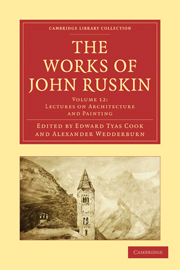Book contents
- Frontmatter
- Contents
- LIST OF ILLUSTRATIONS
- INTRODUCTION TO THIS VOLUME
- PART I “LECTURES ON ARCHITECTURE AND PAINTING” (1854)
- PART II REVIEWS, LETTERS, AND PAMPHLETS ON ART (1844–1854)
- APPENDIX TO PART II
- PART III “NOTES ON THE CONSTRUCTION OF SHEEPFOLDS” (1851)
- APPENDIX TO PART III
- PART IV LETTERS ON POLITICS (1852)
- I “TAXATION, AND PRINCIPALLY BREAD TAX”
- II ELECTION
- Plate section
II - ELECTION
Published online by Cambridge University Press: 05 November 2011
- Frontmatter
- Contents
- LIST OF ILLUSTRATIONS
- INTRODUCTION TO THIS VOLUME
- PART I “LECTURES ON ARCHITECTURE AND PAINTING” (1854)
- PART II REVIEWS, LETTERS, AND PAMPHLETS ON ART (1844–1854)
- APPENDIX TO PART II
- PART III “NOTES ON THE CONSTRUCTION OF SHEEPFOLDS” (1851)
- APPENDIX TO PART III
- PART IV LETTERS ON POLITICS (1852)
- I “TAXATION, AND PRINCIPALLY BREAD TAX”
- II ELECTION
- Plate section
Summary
Venice, March 11, 1852.
§ 9. Election. I pass to the second of the subjects named in my former letter, namely, “Election.” If by a “member of Parliament” we at present, in England, understand the mouthpiece of a constituency; a person, that is to say, sent into the House of Commons to express by vote what he believes to be the opinion of the majority of his constituents on any given question, subject to the penalty of the loss of seat if he venture to express any other opinion, I have nothing to say respecting our principles of election; but in that case it is a pity we take the pains and undergo the agitation of elections at all. It would be wiser and cheaper to make wooden members of Parliament and work them by electric telegraph from the constituent towns and counties.
But if a member of Parliament is in any sort supposed to be a man chosen because he is wiser than other people, in order that, with other such chosen men, he may deliberate on questions too hard for the body of the people to decide (they not having, for the most part, time or opportunity to examine all their bearings), and that, having arrived at conclusions on such questions, the chosen body may declare and put them in practice, irrespective of the opinions of those who elected them—as far, I say, as this is the idea of a member of Parliament, so far our modes of election are simply insane (and if this be not the idea of a member of Parliament, any election whatever is useless).
- Type
- Chapter
- Information
- The Works of John Ruskin , pp. 600 - 603Publisher: Cambridge University PressPrint publication year: 2010First published in: 1903

